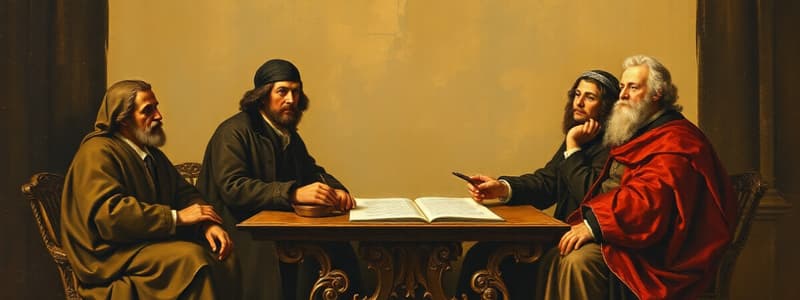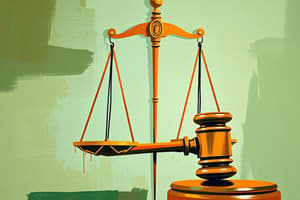Podcast
Questions and Answers
What was one example of a personal flaw among some of the Founders mentioned?
What was one example of a personal flaw among some of the Founders mentioned?
- James Madison's dishonesty
- Thomas Jefferson's pride
- Thomas Paine's fondness for alcohol (correct)
- George Washington's political ambition
What did the Founders believe about the potential for a better world?
What did the Founders believe about the potential for a better world?
- They believed it was impossible to improve society.
- They were skeptical about the future.
- They only focused on their own success.
- They thought a better world was possible. (correct)
Which of the following statements accurately reflects the perspective on contemporary historical writings about the Founders?
Which of the following statements accurately reflects the perspective on contemporary historical writings about the Founders?
- Many books are biased and may discredit the Founders. (correct)
- All historical books agree on the Founders' motives.
- Most writings praise the Founders unconditionally.
- Only academic books are to be trusted.
What is highlighted as a significant outcome of the Founders' competing interests?
What is highlighted as a significant outcome of the Founders' competing interests?
What is suggested as the best way to learn about the Founders?
What is suggested as the best way to learn about the Founders?
What concept did Hamilton express regarding a Higher Law?
What concept did Hamilton express regarding a Higher Law?
What is revealed about the Founders’ historical narratives concerning their character and actions?
What is revealed about the Founders’ historical narratives concerning their character and actions?
What is the central concept emphasized regarding the Higher Law?
What is the central concept emphasized regarding the Higher Law?
What does Jefferson imply about moral laws in relation to the majority?
What does Jefferson imply about moral laws in relation to the majority?
What does the act of bowing symbolize in the context of American values?
What does the act of bowing symbolize in the context of American values?
Which statement best reflects the views expressed by Alexander Hamilton regarding the Higher Law?
Which statement best reflects the views expressed by Alexander Hamilton regarding the Higher Law?
How does the belief in a Higher Authority relate to political and legal systems according to Henry Sumner Maine?
How does the belief in a Higher Authority relate to political and legal systems according to Henry Sumner Maine?
What aspect does the phrase 'all men are created equal' highlight about the Higher Law?
What aspect does the phrase 'all men are created equal' highlight about the Higher Law?
Which of the following statements is consistent with the idea of Higher Law discussed?
Which of the following statements is consistent with the idea of Higher Law discussed?
What question is raised concerning the Higher Law?
What question is raised concerning the Higher Law?
Flashcards
Higher Law
Higher Law
The idea that a universal set of rules, originating from a higher power, governs all humanity, regardless of individual beliefs or social status.
Equal Application of Higher Law
Equal Application of Higher Law
The principle that every individual, regardless of their position or power, is subject to the same set of moral and legal rules.
All Men Are Created Equal
All Men Are Created Equal
The idea that individuals have intrinsic worth and deserve the same rights and freedoms, based on their common humanity.
Bow
Bow
Signup and view all the flashcards
Stand Tall
Stand Tall
Signup and view all the flashcards
Supernatural Presidency
Supernatural Presidency
Signup and view all the flashcards
Learning and Applying Higher Law
Learning and Applying Higher Law
Signup and view all the flashcards
Common Ground
Common Ground
Signup and view all the flashcards
The Founders' Work
The Founders' Work
Signup and view all the flashcards
Flaws of the Founders
Flaws of the Founders
Signup and view all the flashcards
Founders and Their Context
Founders and Their Context
Signup and view all the flashcards
Checks and Balances
Checks and Balances
Signup and view all the flashcards
Equality of Humans
Equality of Humans
Signup and view all the flashcards
Higher Authority and Law
Higher Authority and Law
Signup and view all the flashcards
Who were the 'Founders'
Who were the 'Founders'
Signup and view all the flashcards
Study Notes
Higher Law and American Founders
- Founders believed in a Higher Authority and a Higher Law, obligatory on all mankind, regardless of status or group affiliation.
- This concept is central to the Declaration of Independence's "all men are created equal," implying equal rights and responsibilities for everyone.
- The Higher Law principles prohibit actions like stealing, regardless of majority opinion or perceived necessity; the law applies to all, without exceptions.
- Americans historically demonstrate adherence to the law through actions like shaking hands, implying equality and acknowledging non-exemption from the law.
- Belief in a Higher Law and Authority has ancient roots, seen in early political and legal systems.
Founders' Work and Insights
- Many Founders' writings have been largely forgotten.
- The Founders were exceptionally insightful and wise figures.
- Study of the Founders' work is highly valuable, with figures like Jefferson, Madison, and Henry offering profound insights.
- The Founders, despite their flaws (e.g., Washington's military blunders, Franklin's philanderings, slavery ownership by some), championed a better world; thus making them heroes.
- Their vision and efforts have significantly shaped America's liberty and prosperity.
Critiques and Contextualization
- Modern interpretations of American history may contain biases, potentially discrediting the Founders' principles.
- It's important to start with the Founders' original writings, avoiding secondary sources that may present biased perspectives.
- While the Founders were not perfect (e.g. some had personal flaws and conflicting agendas), the Constitution, despite their flaws emerged as a document containing checks and balances, which has ultimately delivered the most free and prosperous nation in history.
- It is vital to set aside prior biases and religious conflicts when examining the Founders' principles.
Common Ground Among Religions
- Religions, despite their differences, can align on fundamental ethical principles, values, and principles.
- Historical examples of religious conflicts (Crusades, Inquisition, Thirty Years War) highlight that religion can be misused for harmful purposes.
- Focus on shared, positive aspects across religions will be the focus for the subsequent letter.
Studying That Suits You
Use AI to generate personalized quizzes and flashcards to suit your learning preferences.




